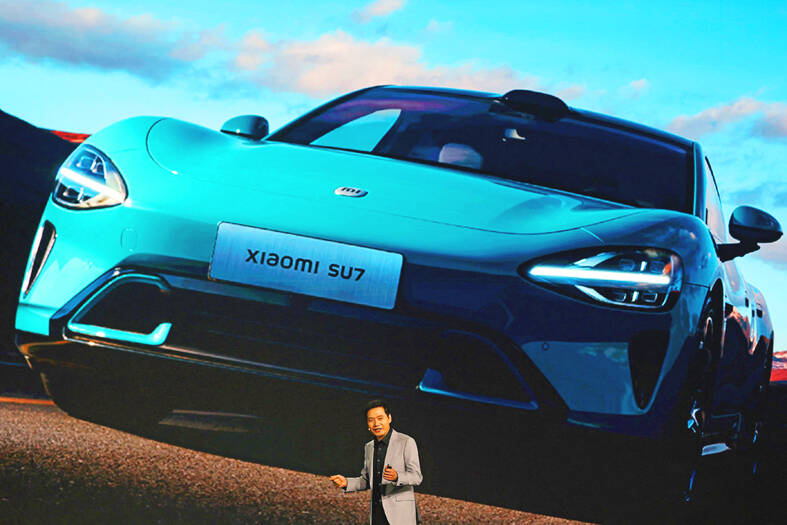Chinese consumer electronics giant Xiaomi Corp (小米) unveiled its first four-wheeled electric vehicle (EV) yesterday, with company founder and chief executive officer Lei Jun (雷軍) saying it has ambitions to become a global automotive powerhouse, despite fierce competition at home.
Beijing-based Xiaomi, which is the world’s fourth-largest smartphone manufacturer, is also a leading provider of tablets, smartwatches, headphones and electric scooters.
The company in 2021 announced its intended foray into EVs, joining a trend that has seen several major Chinese tech companies pivot toward the highly competitive sector.

Photo: REUTERS/Florence Lo
Lei took to the stage in Beijing yesterday to unveil the SU7, a sedan that is scheduled to enter the market in 2025.
The model is integrated with Xiaomi software to enable functionality across the firm’s range of devices and would be produced by local manufacturer BAIC Group (北汽集團), the company said.
“The goal is to become one of the world’s top five automotive manufacturers through 15 to 20 years of hard work,” Lei said.
The SU7’s batteries are to be supplied by China’s largest electric automaker, BYD Co (比亞迪), as well as domestic battery giant Contemporary Amperex Technology Co (寧德時代).
Many top tech firms in China — which is the world’s largest automotive market — have invested recently in the country’s EV sector.
BYD was the undisputed leader of China’s EV market last month with more than 300,000 models sold, ahead of Tesla Inc’s more than 80,000, China Association of Automobile Manufacturers data showed.
Founded in 2010, Xiaomi has achieved rapid growth through its strategy of marketing high-end devices at affordable prices, which were initially sold directly through online channels.
The firm was placed on a blacklist by the US in 2021 due to alleged links to the Chinese military.

Anna Bhobho, a 31-year-old housewife from rural Zimbabwe, was once a silent observer in her home, excluded from financial and family decisionmaking in the deeply patriarchal society. Today, she is a driver of change in her village, thanks to an electric tricycle she owns. In many parts of rural sub-Saharan Africa, women have long been excluded from mainstream economic activities such as operating public transportation. However, three-wheelers powered by green energy are reversing that trend, offering financial opportunities and a newfound sense of importance. “My husband now looks up to me to take care of a large chunk of expenses,

SECTOR LEADER: TSMC can increase capacity by as much as 20 percent or more in the advanced node part of the foundry market by 2030, an analyst said Taiwan Semiconductor Manufacturing Co (TSMC, 台積電) is expected to lead its peers in the advanced 2-nanometer process technology, despite competition from Samsung Electronics Co and Intel Corp, TrendForce Corp analyst Joanne Chiao (喬安) said. TSMC’s sophisticated products and its large production scale are expected to allow the company to continue dominating the global 2-nanometer process market this year, Chiao said. The world’s largest contract chipmaker is scheduled to begin mass production of chips made on the 2-nanometer process in its Hsinchu fab in the second half of this year. It would also hold a ceremony on Monday next week to

TECH CLUSTER: The US company’s new office is in the Shalun Smart Green Energy Science City, a new AI industry base and cybersecurity hub in southern Taiwan US chip designer Advanced Micro Devices Inc (AMD) yesterday launched an office in Tainan’s Gueiren District (歸仁), marking a significant milestone in the development of southern Taiwan’s artificial intelligence (AI) industry, the Tainan City Government said in a statement. AMD Taiwan general manager Vincent Chern (陳民皓) presided over the opening ceremony for the company’s new office at the Shalun Smart Green Energy Science City (沙崙智慧綠能科學城), a new AI industry base and cybersecurity hub in southern Taiwan. Facilities in the new office include an information processing center, and a research and development (R&D) center, the Tainan Economic Development Bureau said. The Ministry

State-run CPC Corp, Taiwan (CPC, 台灣中油) yesterday signed a letter of intent with Alaska Gasline Development Corp (AGDC), expressing an interest to buy liquefied natural gas (LNG) and invest in the latter’s Alaska LNG project, the Ministry of Economic Affairs said in a statement. Under the agreement, CPC is to participate in the project’s upstream gas investment to secure stable energy resources for Taiwan, the ministry said. The Alaska LNG project is jointly promoted by AGDC and major developer Glenfarne Group LLC, as Alaska plans to export up to 20 million tonnes of LNG annually from 2031. It involves constructing an 1,290km